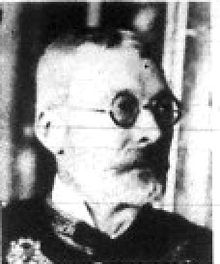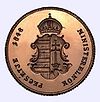- Gyula Károlyi
-
Count Gyula Károlyi de Nagykároly 
Prime Minister of the Kingdom of Hungary In office
24 August 1931 – 1 October 1932
(1 year, 38 days)Preceded by István Bethlen Succeeded by Gyula Gömbös Prime Minister of the Counter-Revolutionary Government of the Hungarian Soviet Republic In office
5 May 1919 – 12 July 1919Succeeded by Dezső Pattantyús-Ábrahám Personal details Born May 7, 1871
Nyírbakta, HungaryDied April 23, 1947 (aged 75)
Budapest, HungaryNationality Hungarian Political party Liberal Party, Unity Party Profession politician The native form of this personal name is nagykárolyi gróf Károlyi Gyula. This article uses the Western name order.Gyula Count Károlyi de Nagykároly (7 May 1871, Baktalórántháza - 23 April 1947) was a conservative Hungarian politician who served as Prime Minister of Hungary from 1931 to 1932. He had previously been Prime Minister of the counter-revolutionary government in Szeged for several months in 1919. As Prime Minister, he generally tried to continue the moderate conservative policies of his predecessor, István Bethlen, although with less success.
Contents
Early life
He was born in Nyírbakta (now: Baktalórántháza) to an old aristocrat family. His parents were Count Tibor Károlyi, who served as Speaker of the House of Magnates from 1898 to 1900 and Countess Emma Degenfeld-Schomburg.
After the grammar school studies he attended Faculty of Law of the University of Budapest. Then he learnt in the University of Berlin and the University of Bonn. After the returning to home, he joined to the Hungarian politics as member of the House of Magnates. He served as ispan of Arad County between 1906 and 1910. Following this he retired from the politics and started farming on the huge family possession in Arad County. He became member of the Hungarian Academy of Sciences in 1915.
Counter-revolutionary Government
After the broke out of the First World War he enrolled to train as a volunteer and fought in the Eastern Front as a hussar lieutenant. After the war he returned to his possessions. But the country's situation was chaotic: his cousin, Mihály Károlyi led the Aster Revolution and the Austro-Hungarian Monarchy collapsed. The new leadership decreased the Hungarian Army's staff numbers to indicate his peaceful intention towards the Entente Powers. The adjacent countries (Romania, Czechoslovakia) took advantage of this to get even more areas. The Romanians occupied Transylvania and the Partium on Spring 1919. In addition the Hungarian Soviet Republic established on 21 March 1919.
Many considerable Hungarian politicians emigrated to Vienna because of the revolutions and terrors. The organization began with István Bethlen's leadership onto the liquidation of the Bolshevik power (Antibolsevist Comite). In parallel with this Gyula Károlyi formed a counter-revolutionary government in Arad. On May the Romanians occupied the town and they interned Károlyi and many of his ministers. After his release went to Szeged, which was controlled by the French Army. Károlyi reorganized his government here against the communist rule. The two counter-revolutionary centres (Vienna and Szeged) harmonized their work in the interest of the common aims. Károlyi's Minister of War was Admiral Miklós Horthy. Horthy set up the National Army. The two politicians' friendship was beginning at this time.
Prime Minister of Hungary
Károlyi retired from the politics for nearly ten years after 1919. After the Treaty of Trianon the family lost his possessions of Arad County. Károlyi farmed in Szabolcs County and Szatmár County. He became member of the House of Magnates in 1927. He got a title of Crown Guard in 1928. He undertook a bigger role in the politics due to the Great Depression. He became Minister of Foreign Affairs for a short time in cabinet of István Bethlen, following Lajos Walko. In this quality of his Károlyi visited Benito Mussolini in Rome on March 1931. He had also a debated statement: "the emotions, the reason, and the threads of the interest bind Hungary to France". His statement gave rise to an appearance in the French press.
István Bethlen resigned from his position on 19 August 1931, because he did not want to bring unpopular measures. Regent Miklós Horthy appointed Károlyi to this post. The new cabinet established on 24 August 1931. The ministerial combination did not change very much.
In Hungary the economic catastrophe presented himself as protracted agrarian and credit crisis. The agricultural products meant the big part of the Hungarian exports, but these price attained the 50-70 % contour flying on the World Market. So the local agriculture and peasants' situation became horrible, but the industry and trade also suffered from the effects of the crisis.
Károlyi wanted to reduce the state expenses with a large-scale economical program. The Ministry of Finance reduced the state employees' payment (etc. railwaymen, postmen, clerks, the army, gendarmerie, the river forces and the customs). They tightened the social benefits and the pensions were moderated. However this was not a solution onto the serious economic problems. It did not help a lot, that Károlyi spared himself and his minister colleagues, and revoked the right of the usage of the state cars. This meant it that he - as Prime Minister - had to go to work from his apartment of Pest to the Buda Castle.
Szilveszter Matuska blew up a portion of the Biatorbágy bridge near Budapest, causing the engine and nine of the eleven coaches forming the Vienna Express to plunge into a ravine 30 meters deep on 13 September 1931. Gyula Károlyi ordered the martial law in two of his orders. He made use of this tragedy for the communists' imprisonment. He banned all political-like rallies and processions. The organizing communist movement's leaders, Imre Sallai and Sándor Fürst were captured and arrested. They were executed in 1932 after a show trial. The emergency did not improve the situation however, there was not a mass movement like that beside the one that may have reported a real threat with regard to the existing system.
The Prime Minister's restrictive measures were not able to relieve the crisis. The discontent intensified inside the society's and the political elite's groves. The opposition demanded the franchises' extension, the primary and secret suffrage's introduction and more effective protection of the people who live from the wage. While the agrarian lobby demanded the market's extension and the hosts' protection for the decreasing of the agrarian crisis. This group turned against the Prime Minister after actual results did not emerge here.
Bethlen called on Károlyi to resign after he saw that Károlyi's governance failed on September 1932. He employed this advice gladly, because he already took the position hesitantly at the time of the beginnings. Károlyi resigned on 21 September 1932 and returned to his possessions. He was succeeded by Gyula Gömbös.
Later life
After his prime ministership he retired from the active politics. He was member of the Regent's inner advisor council. Horthy appointed him secret advisor in 1936. During the Second World War he supported the politics of Miklós Kállay. Károlyi died in Budapest at the age of 75.
References
Political offices Preceded by
—Prime Minister of the Counter-Government of Hungary
1919Succeeded by
Dezső Pattantyús-ÁbrahámPreceded by
Lajos WalkoMinister of Foreign Affairs
1930–1931Succeeded by
Lajos WalkoPreceded by
István BethlenPrime Minister of Hungary
1931–1932Succeeded by
Gyula GömbösPreceded by
Sándor Wekerle Jr.Minister of Finance
Acting
1931Succeeded by
Frigyes KorányiPrime Ministers of Hungary since 1848 Revolution of 1848 Kingdom of Hungary Transition period M. Károlyi · Berinkey · Garbai · Peidl (opposed by G. Károlyi · Pattantyús-Ábrahám) · Friedrich · HuszárRegency Transition period Communist Hungary Republic of Hungary Italics indicates interim holderMinisters of Foreign Affairs of Hungary since 1848 Revolution of 1848 Esterházy · K. BatthyányKingdom of Hungary Festetics · Wenckheim · K. Tisza · Orczy · Szőgyény-Marich · Fejérváry · L. Tisza · Andrássy · Fejérváry · Jósika · D. Bánffy · M. Széchényi · Széll · G. Széchényi · Khuen-Héderváry · I. Tisza · Khuen-Héderváry · Fejérváry · Zichy · Khuen-Héderváry · Lukács · Burián · I. Tisza · Roszner · T. Batthyány · ZichyTransition period T. Batthyány · M. Károlyi · Berinkey · Harrer · Kun · Pogány · Kun · Ágoston · Tánczos · Lovászy · SomssichRegency Transition period Communist Hungary Republic of Hungary Ministers of Finance of Hungary since 1848 Revolution of 1848 Kingdom of Hungary Lónyay · Kerkapoly · Szlávy · Ghyczy · Széll · Tisza · Szapáry · Tisza · Wekerle Sr. · Lukács · Fejérváry · Hegedűs · Wekerle Sr. · Lukács · Teleszky · Gratz · Wekerle Sr. · PopovicsTransition period Regency Transition period Communist Hungary Republic of Hungary Categories:- 1871 births
- 1947 deaths
- People from Baktalórántháza
- Prime Ministers of Hungary
- Foreign ministers of Hungary
- Finance ministers of Hungary
- Károlyi family
- Hungarian politician stubs
Wikimedia Foundation. 2010.

